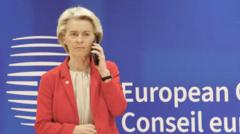The European Court's ruling emphasizes the need for transparency in dealings related to pandemic measures.
European Court Demands Transparency: Von der Leyen's Messages to Pfizer Must Be Released

European Court Demands Transparency: Von der Leyen's Messages to Pfizer Must Be Released
EU's top court rebukes the European Commission over denied access to crucial vaccine negotiation texts
In a significant ruling, the European Union's General Court has declared that the European Commission erred in denying access to text messages exchanged between Ursula von der Leyen and Pfizer CEO Albert Bourla during pivotal negotiations for Covid-19 vaccines. These exchanges are pivotal, following a series of multi-billion euro contracts signed between the EU and Pfizer in 2021, which included a staggering deal for 1.8 billion doses. The court criticized the Commission's failure to provide a convincing justification for withholding the messages after a journalist's request in 2021, labeling the ongoing situation as Pfizergate.
Transparency International heralded the court's decision as a vital victory for accountability within the EU, calling it a potential turning point in promoting openness towards freedom of information. This scrutiny comes at a crucial time for von der Leyen, who, since assuming office in 2019, has been at the helm of the EU's response to the pandemic. With her recent re-election for a second term, the implications of this ruling could cast a shadow over her legacy, especially regarding transparency in the vaccine procurement process.
The debacle first came to light in April 2021, thanks to a report by New York Times journalist Matina Stevis, outlining von der Leyen's private negotiations with Bourla after expedited approval of Pfizer's vaccine. Following this, investigative journalist Alexander Fanta initiated a Freedom of Information request to obtain a record of their communications between January 2021 and May 2022. However, the Commission initially denied this request, citing the absence of the documents.
Though EU regulations require systematic documentation by all Commission staff, mobile text messages remained undefined in this context, complicating the issue. An internal debate arose about whether these messages should be classified as public records. The subsequent attempts by Fanta to escalate the case to the European Ombudsman found the Commission's inaction amounted to maladministration, which was instrumental in bringing the issue to court.
In their latest ruling, the court criticized the Commission for relying on vague assumptions and inaccurate information, ultimately placing the onus on the Commission to justify the non-existence of the requested messages. The court left questions about the potential deletion of the messages unanswered, pointing out a lack of clarity from the Commission on whether such actions had been deliberate or a result of von der Leyen changing her phone.
As the fallout from this ruling continues, the Commission has stated its intent to review the court's verdict and formulate a response, reiterating that transparency is a fundamental priority in its operations. Nonetheless, the ruling has already sparked discussions about the need for clearer standards regarding the documentation and public access to communications linked to crucial policy decisions.
Transparency International heralded the court's decision as a vital victory for accountability within the EU, calling it a potential turning point in promoting openness towards freedom of information. This scrutiny comes at a crucial time for von der Leyen, who, since assuming office in 2019, has been at the helm of the EU's response to the pandemic. With her recent re-election for a second term, the implications of this ruling could cast a shadow over her legacy, especially regarding transparency in the vaccine procurement process.
The debacle first came to light in April 2021, thanks to a report by New York Times journalist Matina Stevis, outlining von der Leyen's private negotiations with Bourla after expedited approval of Pfizer's vaccine. Following this, investigative journalist Alexander Fanta initiated a Freedom of Information request to obtain a record of their communications between January 2021 and May 2022. However, the Commission initially denied this request, citing the absence of the documents.
Though EU regulations require systematic documentation by all Commission staff, mobile text messages remained undefined in this context, complicating the issue. An internal debate arose about whether these messages should be classified as public records. The subsequent attempts by Fanta to escalate the case to the European Ombudsman found the Commission's inaction amounted to maladministration, which was instrumental in bringing the issue to court.
In their latest ruling, the court criticized the Commission for relying on vague assumptions and inaccurate information, ultimately placing the onus on the Commission to justify the non-existence of the requested messages. The court left questions about the potential deletion of the messages unanswered, pointing out a lack of clarity from the Commission on whether such actions had been deliberate or a result of von der Leyen changing her phone.
As the fallout from this ruling continues, the Commission has stated its intent to review the court's verdict and formulate a response, reiterating that transparency is a fundamental priority in its operations. Nonetheless, the ruling has already sparked discussions about the need for clearer standards regarding the documentation and public access to communications linked to crucial policy decisions.





















